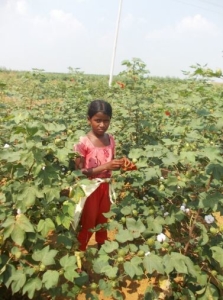IDSN participated in the UN Forum on Business and Human Rights from 29 November – 1 December, learning and drawing attention to the urgent need to address caste discrimination and violence in global supply chains.
IDSN took part in many sessions including on gender mainstreaming, tech regulation, mandatory human rights and environmental due diligence and charting the next decade of UN work on business and human rights.
The IDSN recommendations and briefing on caste- and gender violence and discrimination in global garment supply chains was shared with speakers and participants as was the IDSN Brief and recommendations for UN and EU actors on addressing caste-hate speech in a global context.
Several panellists including Anita Ramasastry and Fernanda Hopenhaym, of the UN Working Group on Business and Human Rights and Nora Götzmann of The Danish Institute for Human Rights, responded directly to IDSN’s questions and noted the need to address caste discrimination and violence, calling caste a blind spot that must be acknowledged and tackled.
This blind spot was also pointed out by IDSN in the lack of a single mention of caste or minorities in the UNGPs 10+: A Roadmap For The Next Decade of Business And Human Rights launched on the first day of the forum. While the roadmap includes many valuable points, IDSN has urged that the omission of reference to caste and minorities is remedied and also provided input to this roadmap back in January 2021.
Speakers at all sessions repeatedly stressed the need to consult and actively engage with affected and marginalised communities in not only remedy but also the design of policies and tools meant to address human rights abuses in supply chains. This is also a key recommendation from IDSN when it comes to lower caste workers (including home workers) in global supply chains.
Following the forum, IDSN will continue to engage with the Working Group members and other speakers to ensure visibility and action on caste- and gender discrimination and violence in supply chains.
Key tweets from IDSN’s participation at the UN Forum on Business and Human Rights
Dear #UnForumBHR, Let's get serious about stopping human rights abuses in supply chains. We can start by stepping up action en caste- & gender violence and discrimination in the garment sector. Our clothes should not be costing lives. Recommendations 👇https://t.co/u5yczwnNYU pic.twitter.com/s6U8kKPxaO
— International Dalit Solidarity Network (IDSN) (@idsnupdates) November 29, 2021
So disappointing that there is not a single mention of caste or minorities in this roadmap despite input provided – https://t.co/jKbcZLVRh3 – For an example of why we must do better read this brief on caste and gender violence in garment supply chains https://t.co/fiN7yeJdHk https://t.co/IUEk3EiLDZ
— International Dalit Solidarity Network (IDSN) (@idsnupdates) November 29, 2021
Thank you Nora Götzman from @HumanRightsDK for commenting on the need to address blind spots such as caste & informal workers in the context of business & human rights & ensuring that we talk to affected women directly // at #UnForumBHR Gender session today
— International Dalit Solidarity Network (IDSN) (@idsnupdates) November 29, 2021
Thank you @fernanda_ho for mentioning caste in your listing of women affected by intersectional discrimination that businesses need to pay attention to when speaking at the #UnForumBHR panel on gender today – too many times it is left out. #CasteGenderJustice #NoCasteLeftBehind
— International Dalit Solidarity Network (IDSN) (@idsnupdates) November 29, 2021
Thank you @idsnupdates for raising the issue of caste based discrimination in workplaces around the globe. Overlooked as many businesses don’t know this systemic discrimination exists. An assumption that all South Asians are the same https://t.co/LpQijnObm1
— Anita Ramasastry (@ARamasastry) November 29, 2021
Great interventions at #UNForumBHR Tech session by @ARamasastry @dianavladcalcic @O_BennettEU highlighting need for regulation of tech giants to address hate-speech, gender-based violence & biased algorithms. Echoes recs from our caste-hate research👇https://t.co/cxnXZTwV8L pic.twitter.com/ctRV3ACc6v
— International Dalit Solidarity Network (IDSN) (@idsnupdates) November 30, 2021
At #UNForumBHR session on stakeholder perspective of #UNGPs. Many important issues discussed but key is REMEDY and access to justice for the most marginalised including IPs, Tribals and the millions of #Dalit workers who face labour and rights abuses 1/
— International Dalit Solidarity Network (IDSN) (@idsnupdates) November 30, 2021
– As we design mandatory human rights due diligence we need to look at how to bring in the affected communities in meaningful engagement right from the start in designing these mechanisms and in seeking remedy – says @ @arkwesi at #UNForumBHR – We couldn't agree more!
— International Dalit Solidarity Network (IDSN) (@idsnupdates) November 30, 2021
HOW do the most marginalised and excluded know what their rights are – especially In particular those affected by caste and discrimination based on work and descent. Engagement and dialogue when considering #mHredd
Empower stakeholders on the ground says @arkwesi #UNForumBHR— International Dalit Solidarity Network (IDSN) (@idsnupdates) November 30, 2021
– There is a lack of resources of OECD National Contact Points & a lack of awareness & enforcement of OECD guidelines in countries – incentives need to be given says @hkjohnsonyeung at #UNForumBHR. This is certainly also the case for caste-based HR violations in South Asia
— International Dalit Solidarity Network (IDSN) (@idsnupdates) December 1, 2021
– We need to focus on the systemic ways in which child & forced labour comes about – such as lack of access to unions & mechanisms – this is what needs addressing says Blake Harwell / @TUACOECD – We agree! Addressing systemic caste discrimination & similar root causes is also key
— International Dalit Solidarity Network (IDSN) (@idsnupdates) December 1, 2021
#UNForumBHR Labour rights are fundamental human rights. Localising the #UNGPs’ stresses need for rights-based approach. Rights holders at the table – and given a voice. These must be those most marginalised and excluded, including #dalits #adivasis @WGBizHRs @ilo @BizHRAsia_UNDP
— International Dalit Solidarity Network (IDSN) (@idsnupdates) December 1, 2021

